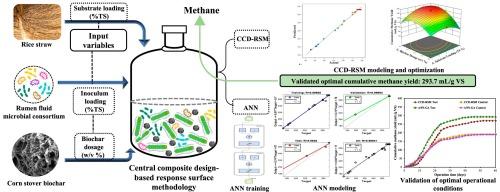Modeling and optimization of biomethanation of rice straw with biochar supplementation using response surface methodology and machine learning
IF 7.1
2区 工程技术
Q1 ENERGY & FUELS
Sustainable Energy Technologies and Assessments
Pub Date : 2024-09-28
DOI:10.1016/j.seta.2024.104006
引用次数: 0
Abstract
Anaerobic digestion (AD) of lignocellulosic wastes offers sustainable waste management with the production of renewable energy and nutrient-rich bio-slurry. However, the chemical recalcitrant structure of lignocellulosic waste hinders its hydrolysis and biomethanation under AD. Biochar addition has been reported to alleviate toxicity inhibition and improve the degradability of lignocellulosic wastes, biogas and methane yield, and stability of the AD process. Therefore, in this study, substrate loading (% total solids (TS)), inoculum loading (% TS), and biochar dosage (w/v%) were optimized to maximize the methane yield by using central composite design (CCD) based response surface methodology (RSM) and genetic algorithm (GA). The second-order quadratic model was established by CCD-RSM, which revealed the notable interaction between substrate loading and biochar dosage (p-value < 0.0001) and between inoculum loading and biochar dosage (p-value < 0.05). Based on the root mean square error (RMSE) and coefficient of determination (R2) values, the cumulative methane yield (CMY) prediction performance of the artificial neural network (ANN) (RMSE = 0.876, R2 = 0.9894) was more reliable and accurate than CCD-RSM (RMSE = 3.34, R2 = 0.9956). The GA optimal conditions showed 8.6% higher methane yield (293.7 ± 7.26 mL/g VS) than the CCD-RSM (270.2 ± 10.69 mL/g VS). The methane yield obtained at optimal conditions of GA was 54.9% higher than the control. The CCD-RSM and ANN-GA can also be used for process modeling and optimization in other contexts. The optimal outcomes obtained in this study could pave the way for the prediction and operation of continuous AD of rice straw supplemented with additives such as biochar for large-scale bioenergy production.

利用响应面方法学和机器学习对添加生物炭的稻草生物甲烷化进行建模和优化
对木质纤维素废物进行厌氧消化(AD)可以生产可再生能源和营养丰富的生物泥浆,从而实现可持续废物管理。然而,木质纤维素废物的化学难降解结构阻碍了其在厌氧消化过程中的水解和生物甲烷化。有报道称,添加生物炭可减轻毒性抑制,提高木质纤维素废物的降解性、沼气和甲烷产量以及厌氧消化(AD)工艺的稳定性。因此,在本研究中,采用基于响应面方法学(RSM)和遗传算法(GA)的中心复合设计(CCD)优化了基质添加量(总固体百分比(TS))、接种物添加量(TS 百分比)和生物炭用量(w/v%),以最大化甲烷产量。通过 CCD-RSM 建立的二阶二次模型显示,基质负荷与生物炭用量之间存在显著的交互作用(p 值为 0.0001),接种物负荷与生物炭用量之间也存在显著的交互作用(p 值为 0.05)。根据均方根误差(RMSE)和决定系数(R2)值,人工神经网络(ANN)的累积甲烷产量(CMY)预测性能(RMSE = 0.876,R2 = 0.9894)比 CCD-RSM (RMSE = 3.34,R2 = 0.9956)更可靠、更准确。GA 最佳条件下的甲烷产量(293.7 ± 7.26 mL/g VS)比 CCD-RSM 高 8.6%(270.2 ± 10.69 mL/g VS)。在 GA 最佳条件下获得的甲烷产量比对照组高 54.9%。CCD-RSM 和 ANN-GA 也可用于其他情况下的工艺建模和优化。本研究获得的最佳结果可为大规模生物能源生产中添加生物炭等添加剂的水稻秸秆连续厌氧消化(AD)的预测和操作铺平道路。
本文章由计算机程序翻译,如有差异,请以英文原文为准。
求助全文
约1分钟内获得全文
求助全文
来源期刊

Sustainable Energy Technologies and Assessments
Energy-Renewable Energy, Sustainability and the Environment
CiteScore
12.70
自引率
12.50%
发文量
1091
期刊介绍:
Encouraging a transition to a sustainable energy future is imperative for our world. Technologies that enable this shift in various sectors like transportation, heating, and power systems are of utmost importance. Sustainable Energy Technologies and Assessments welcomes papers focusing on a range of aspects and levels of technological advancements in energy generation and utilization. The aim is to reduce the negative environmental impact associated with energy production and consumption, spanning from laboratory experiments to real-world applications in the commercial sector.
 求助内容:
求助内容: 应助结果提醒方式:
应助结果提醒方式:


